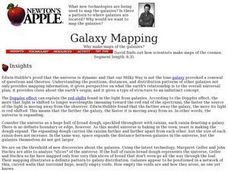Colorado State University
Why Does it Get Colder on a Clear Night than a Cloudy Night?
Clouds are nature's insulator! A lab investigation asks learners to use an infrared thermometer to measure differences in infrared temperatures. They find that pointing the thermometer at a cloud has a much different result than pointing...
University of Colorado
Using Spectral Data to Explore Saturn and Titan
Saturn's rings are made of dust, ice, and solid chunks of material. Individuals use spectrographs in this final installment of 22 lessons to determine the atmospheric elements. They analyze spectrums from Titan's atmosphere and...
Sunlight Cal-Tech
Chromatography of Plant Pigments
Through a hands-on activity, an acetone-spinach solution is pre-made and learners use this solution to separate the pigments found in spinach using chromatography. The comprehensive resource includes an analysis and conclusion...
Cornell University
Optical Simulation of a Transmission Electron Microscope
Don't have an electron microscope? Have your classes build the next best thing! A hands-on lesson asks scholars to build a model of Transmission Electron Microscope (TEM). They then use their models to identify the function of each...
National Nanotechnology Infrastructure Network
Powers of Ten with the Blue Morpho Butterfly
Explore the powers of ten while examining a Blue Morpho butterfly wing. Learners discover there is a lot more than meets the eye when one looks close enough.
National Nanotechnology Infrastructure Network
Making a Liquid Crystal Thermometer
Introduce your classes to a fourth state of matter! Liquid crystals have a colorful sheen that changes based on different physical factors. Learners use this information to create a liquid crystal thermometer where the color of the...
NASA
Tools to Study Tornadoes and Galaxies
Take your class on an intergalactic journey as they explore the galaxy and various meteorological events taking place in our atmosphere each day. Learners investigate electromagnetic waves and the Doppler Effect before gathering radar...
Colorado State University
How Can I Turn a Solar Oven into a Refrigerator?
Whether you want to heat things up in science class or cool things down a bit, an intriguing lab's got you covered! Science scholars explore the principles of thermodynamics using a solar oven, then change the conditions to turn their...
National Institute of Open Schooling
Radioactive Pollution
Radioactive pollutants can enter the body through ingestion, inhalation, absorption, or injection. The last lesson in a series of 36 introduces pupils to radioactive pollution. They study its sources, both natural and man-made, its...
Curated OER
Color Principles - Hue, Saturation, and Value
Students identify different color models and the application of the color theory. They create different visualizations that compare color models.
Curated OER
Solar S’Mores
Students cook with the power of the sun. In this solar energy lesson, students explore solar cooking as they apply scientific principles to cook s'mores.
Curated OER
Photosynthesis
This relatively short PowerPoint contains all of the information necessary to give a clear summary of Photosynthesis. There are a few illustrations and clear descriptions of each stage of the main reactions.
Curated OER
Modern Physics, The Quantum
In this physics worksheet, students examine the relationship between the discrete and continuous spectrum alongside other concepts for the 9 questions.
Curated OER
Is Your Blue Really Blue? [Metamerism]
Students examine color perception and how it relates to metamerism. In this color instructional activity students complete a lab activity that shows them the three basic components of color perception.
Curated OER
Fiber Optics
This is a printout of the slides for a presentation on fiber optics. In bullet-style notes, it covers how optic fibers work, their structure, different types, and their use. You may use these as a lecture guide, or if you want to take...
Curated OER
AC Waveforms
In this AC waveforms worksheet, students answer ten questions about AC voltage, frequencies of waveforms and they interpret diagrams of AC voltage.
Curated OER
Earth's Winds, Crust, and Atmosphere
This site provides a variety of activities and worksheets about the problem-based learning activity about Earth and its atmosphere. The lessons can be used separately or together in a geology unit. The resources and charts are very...
Curated OER
Colors of the Universe Scavenger Hunt
In this colors of the universe activity, students explore the Internet to access one specific website to answer five short answer questions about the colors of the universe.
Curated OER
Leaf Chromatography
In this leaf chromatography worksheet, learners separate the pigments of a leaf using paper chromatography. They answer 4 questions about their results and draw the colors they observe on their chromatogram from the leaf.
Curated OER
Galaxy Mapping
Students research the constellations and discuss their findings. Then they construct their own maps of the galaxy using paper, black paint, aluminum foil, etc. They make a 3-D map of their chosen constellation.
Curated OER
Plant Pigments
Students investigate the components of chlorophyll. They use paper chromatography to separate the many pigments of chlorophyll from one another.
Curated OER
The Spectrum of a Star
Tenth graders identify stars based on their line spectra. In this astronomy lesson, 10th graders analyze spectrograph and determine the elements present in the star. They explain the relationship between temperature and star classes.
Curated OER
Climate And the Greenhouse Effect
Students demonstrate the greenhouse effect. They recognize that relatively small changes to our environment can stimulate significant climate changes. They determine that the "scientific method" is a process of testing hypotheses and...
Curated OER
Keeping Warm When it is Cold: How does a polar bear keep warm?
Students make a model of a polar bear and discuss why fur/skin color is important. They also perform a simple experiment using black and white socks to determine how color affects temperature.













![Is Your Blue Really Blue? [Metamerism] Lesson Plan Is Your Blue Really Blue? [Metamerism] Lesson Plan](http://content.lessonplanet.com/resources/thumbnails/299613/large/otq2otizlmpwzw.jpg?1315624134)









